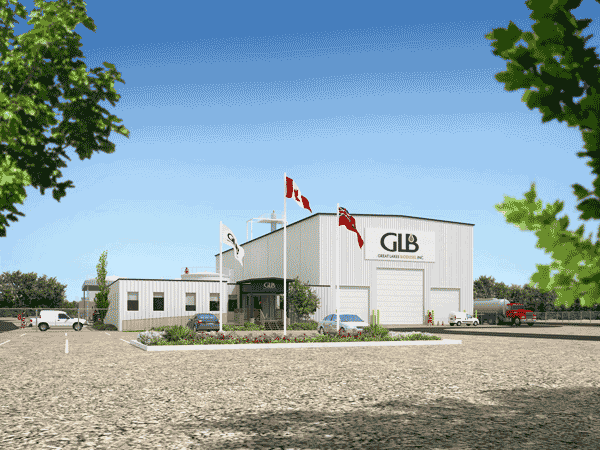Renewable fuel
ALTERNATIVE MARKET FOR SOYBEANS
great lakes biodiesel is constructing the largest biodiesel plant in Canada right here in Ontario. With plans to open in Welland this fall, the plant will have the capacity to produce 170 million liters of biodiesel a year. The facility will be producing ASTM 6751 quality biodiesel made from vegetable oils – including soybeans.

background on biodiesel
Biodiesel is the name given to clean burning alternative fuel, produced from domestic, renewable resources. In Ontario, biodiesel is made primarily from canola and soybean feedstocks as well as other fat and vegetable oils. Biodiesel contains no petroleum, but it can be blended at any level with petroleum diesel to create a blend that can be used in compression-ignition (diesel) engines with little or no modifications.
Biodiesel is made through a chemical process called transesterification where the glycerin is separated from the oil. This process leaves behind two products — methyl esters, the chemical name for biodiesel, and glycerin. Glycerin is a valuable byproduct that is usually sold to be used in soaps and other products.
There are two different types of biofuel products that are currently available.
1. Biodiesel: a fuel comprised of mono-alkyl esters of long chain fatty acids derived from vegetable oils or animal fats, designated B100, and meeting the requirements of ASTM D 6751.
2. Biodiesel Blend: a blend of biodiesel fuel meeting ASTM D 6751 with petroleum-based diesel fuel, designated BXX, where XX represents the volume percentage of biodiesel fuel in the blend.
More commonly, we are seeing biodiesel blends being used in trucks, buses and farm machinery in place of straight petroleum based diesel fuel. A blend of 20 percent biodiesel with 80 percent petroleum diesel is known as B20. It’s produced with a minimum increase in cost for operators and other consumers and provides significant benefits for the environment.
great lakes biodiesel plant
The Great Lakes Biodiesel plant will utilize the latest technology from the Desmet Ballestra Group, an internationally recognized leader in biodiesel technology that supplies over 80 biodiesel plants worldwide. Great Lakes Biodiesel will produce ASTM 6751 quality biodiesel that will be used in vehicles and machinery. CEO Barry Kramble expects to sell this Ontario produced biodiesel within the Canadian marketplace, where it will be used to meet the B2 mandate. The B2 mandate is a government requirement for an average of two percent renewable content in diesel fuel and heating oil.
The location of the plant is also very important. “The southern Ontario region is highly serviced by rail, water and road transportation routes,” notes Kramble. The plant is also located in close proximity to the Eastern Seaboard and strong Ontario and Quebec fuel markets, he said. By having a plant located in Ontario, the demand and growth for jobs in the area as well as spin off subsectors will benefit people across the province. From the farmers who grow soybeans, to the plant workers, to the fuel tankers taking the biodiesel down the highway – the addition of this new plant will be an asset to the southern Ontario area and Welland.
The plant will need nearly 70 million bushels of soybean and canola to operate at full capacity each year. This will create a significant market opportunity for grain farmers looking to expand their soybean acres. •
FUEL FACTS
PLANT DETAILS
• Capacity: 170 million liters per year
• Product: ASTM 6751 biodiesel
• Production Technology: Desmet Ballestra
• Primary Feedstocks: canola, soybean
• On Site Storage Capacity: 8.5 million liters
• Loading/Offloading: rail/truck terminal to service 12-14 rail cars per day
• Production Building: 1,236 sq. meters (13,300 sq. feet)
• Office Building: 400 sq. meters (4,290 sq. feet)
• Total Site Area: 66,045 sq. meters (16.32 acres)
BIODIESEL NUMBERS
• One bushel of soybeans produces about 1.5 gallons of biodiesel.
• Over 100 cities have run demonstrations or test projects utilizing biodiesel, including more than 1,000 buses and several million miles.
• A gallon of soy-based biodiesel contains 132,902 BTUs.
• Biodiesel improves air quality by sharply reducing the emissions, including particulate matter, that straight petroleum diesel releases when it burns.
• Biodiesel-powered engines deliver similar torque, horsepower and kilometres per litre as petroleum-powered diesels.
• Biodiesel does not require new refueling stations, new parts inventories or expensive engine modifications.
• France is currently the world’s largest producer of biodiesel, using it as heating oil
and also in 50 percent blends with petrodiesel.
Source: http://canadacleanfuels.com/index.php/bio-diesel •







